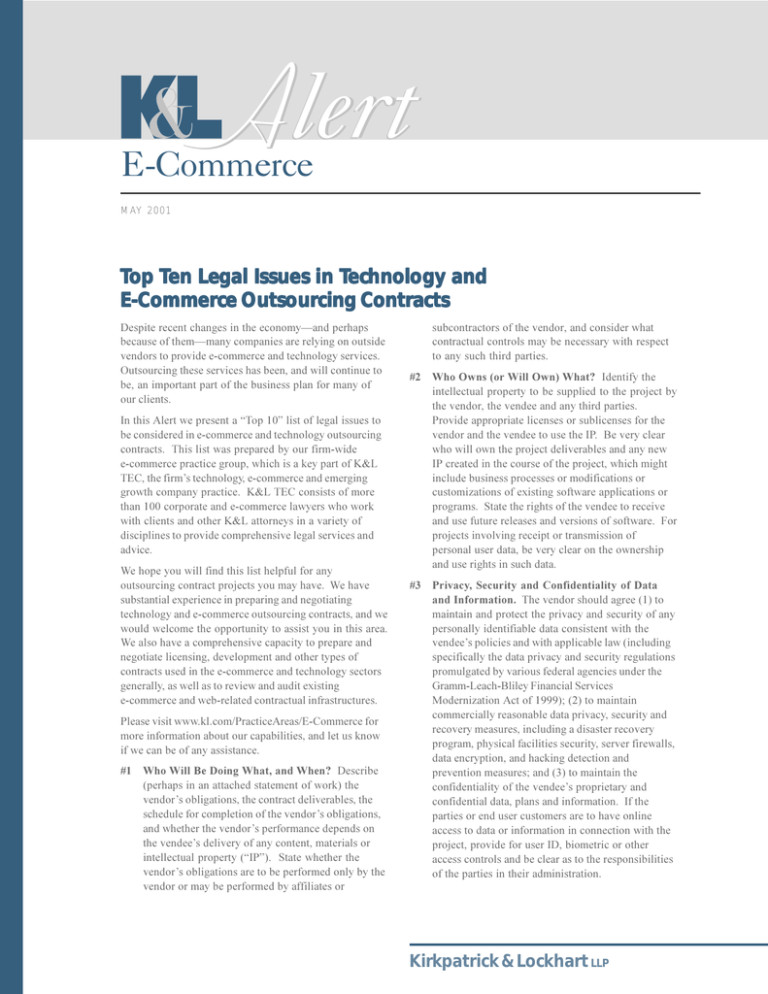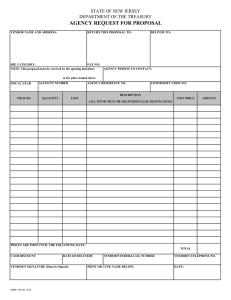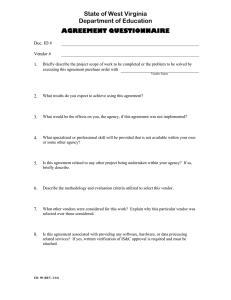
A lert
E-Commerce
MAY 2001
Top T
en Legal Issues in T
echnology and
Ten
Technology
E-Commerce Outsourcing Contracts
Despite recent changes in the economyand perhaps
because of themmany companies are relying on outside
vendors to provide e-commerce and technology services.
Outsourcing these services has been, and will continue to
be, an important part of the business plan for many of
our clients.
subcontractors of the vendor, and consider what
contractual controls may be necessary with respect
to any such third parties.
#2
Who Owns (or Will Own) What? Identify the
intellectual property to be supplied to the project by
the vendor, the vendee and any third parties.
Provide appropriate licenses or sublicenses for the
vendor and the vendee to use the IP. Be very clear
who will own the project deliverables and any new
IP created in the course of the project, which might
include business processes or modifications or
customizations of existing software applications or
programs. State the rights of the vendee to receive
and use future releases and versions of software. For
projects involving receipt or transmission of
personal user data, be very clear on the ownership
and use rights in such data.
#3
Privacy, Security and Confidentiality of Data
and Information. The vendor should agree (1) to
maintain and protect the privacy and security of any
personally identifiable data consistent with the
vendees policies and with applicable law (including
specifically the data privacy and security regulations
promulgated by various federal agencies under the
Gramm-Leach-Bliley Financial Services
Modernization Act of 1999); (2) to maintain
commercially reasonable data privacy, security and
recovery measures, including a disaster recovery
program, physical facilities security, server firewalls,
data encryption, and hacking detection and
prevention measures; and (3) to maintain the
confidentiality of the vendees proprietary and
confidential data, plans and information. If the
parties or end user customers are to have online
access to data or information in connection with the
project, provide for user ID, biometric or other
access controls and be clear as to the responsibilities
of the parties in their administration.
In this Alert we present a Top 10 list of legal issues to
be considered in e-commerce and technology outsourcing
contracts. This list was prepared by our firm-wide
e-commerce practice group, which is a key part of K&L
TEC, the firms technology, e-commerce and emerging
growth company practice. K&L TEC consists of more
than 100 corporate and e-commerce lawyers who work
with clients and other K&L attorneys in a variety of
disciplines to provide comprehensive legal services and
advice.
We hope you will find this list helpful for any
outsourcing contract projects you may have. We have
substantial experience in preparing and negotiating
technology and e-commerce outsourcing contracts, and we
would welcome the opportunity to assist you in this area.
We also have a comprehensive capacity to prepare and
negotiate licensing, development and other types of
contracts used in the e-commerce and technology sectors
generally, as well as to review and audit existing
e-commerce and web-related contractual infrastructures.
Please visit www.kl.com/PracticeAreas/E-Commerce for
more information about our capabilities, and let us know
if we can be of any assistance.
#1
Who Will Be Doing What, and When? Describe
(perhaps in an attached statement of work) the
vendors obligations, the contract deliverables, the
schedule for completion of the vendors obligations,
and whether the vendors performance depends on
the vendees delivery of any content, materials or
intellectual property (IP). State whether the
vendors obligations are to be performed only by the
vendor or may be performed by affiliates or
Kirkpatrick & Lockhart LLP
#4
#5
#6
Performance and Warranty Standards and
Testing of Deliverables. Provide clear standards
for the vendors performance. These can be very
objective (e.g., meets or exceeds XYZ industry
standard), somewhat objective (e.g., professional
and workmanlike manner) or more subjective (e.g.,
to vendees reasonable satisfaction). Tie them to
clear, quantified specifications and parameters for
the project deliverables or services. Provide for a
vendor warranty that the deliverables will comply
with the agreed-upon specifications and standards.
In an ongoing services contract, consider including
fee reductions, rebates or other economic
disincentives to discourage the vendor from failing
to meet agreed-upon standards of performance.
Where feasible, deliverables and services should be
subject to real-time and worst-case-scenario testing
and quality checks before being accepted.
Vendee and End User Training and Support.
Describe the level, amount and availability of
vendee and customer end user training and support
to be provided by the vendor, including installation
support and user documentation, as well as the
additional cost, if any, of such training and support.
For web or application hosting contracts, consider
attaching to the contract a schedule that provides
for escalating vendor response obligations as the
severity of problems increases. Consider which
obligations should be included in the outsourcing
contract and which might be better as part of an ongoing maintenance contract.
Risk Management (Term, Termination,
Indemnity, Liability Limits, Insurance).
Provide term and termination provisions that give
the vendee the flexibility to take advantage of the
contract over an initial term and extensions of that
term if so desired, but that also permit the vendee to
terminate the contract on relatively short notice and
without penalty if the vendors performance is
inadequate. Provide that the vendor will indemnify
the vendee against third party claims, including
particularly IP-related claims, arising from the
vendors performance or breach. Generally limit the
respective liability of the parties to direct and actual
damages, although certain of the vendors indemnity
obligations, such as those for third party IP-related
claims and claims for breach of data-related contract
provisions, should not be so limited. Provide for
the vendor to maintain insurance in commercially
reasonable amounts on its business and operations,
including insurance against e-commerce risks.
#7
Fees and Payment Terms. Clearly describe all fees
and costs to be paid by the parties, including taxes,
and when and by whom they are to be paid.
Consider scheduling milestone or progress payments
tied to the project schedule to encourage the vendor
to meet the schedule.
#8
Project Administration, Reporting and Audit
Rights. Identify and provide contact information
for the vendors representatives who will have
knowledge of and be responsible for the
administration of the project. Depending on the
nature of the project, include a requirement that the
vendor provide regular project status and web or
application usage and metrics reports. Give the
vendee a reasonable right to audit the vendors books
and records regarding the contract and the vendors
performance. In data processing and other mission
critical outsourcing contracts for vendees in
regulated industries such as banking and financial
services, include an acknowledgment and agreement
by the vendor that it and its performance under the
contract may be subject to regulatory oversight and
examination by the vendees regulator.
#9
Transition of Services or Deliverables at End of
Contract. For contracts under which the vendee
will own or be a continuing licensee of deliverables
that are not in the vendees possession, provide for
the transfer of the deliverables (or related work in
process) to the vendee or its designee upon the
termination or expiration of the contract. For
services contracts, provide for the orderly transition
of the services by the vendor to a new service
provider designated by the vendee.
#10 Dispute Resolution. Consider providing for an
initial informal resolution mechanism between
project managers or senior executives of the parties.
Reflect any agreement by the parties to refer
disputes to arbitration, mediation or other forms of
alternative dispute resolution (ADR), including the
rules and procedures that will govern the ADR, the
venue for the ADR, and whether the result of the
ADR will be final and binding. To the extent the
parties contemplate possible resort to the courts,
consider including a choice of forum and an
agreement to be subject to the jurisdiction of the
chosen forum.
BRUCE H. NIELSON
bnielson@kl.com
202.778.9256
BOSTON n DALLAS n HARRISBURG n LOS ANGELES n MIAMI n NEWARK n NEW YORK n PITTSBURGH n SAN FRANCISCO n WASHINGTON
.........................................................................................................................................................................
This publication/newsletter is for informational purposes and does not contain or convey legal advice. The information herein
should not be used or relied upon in regard to any particular facts or circumstances without first consulting with a lawyer.
© 2001 KIRKPATRICK & LOCKHART LLP.
ALL RIGHTS RESERVED.


